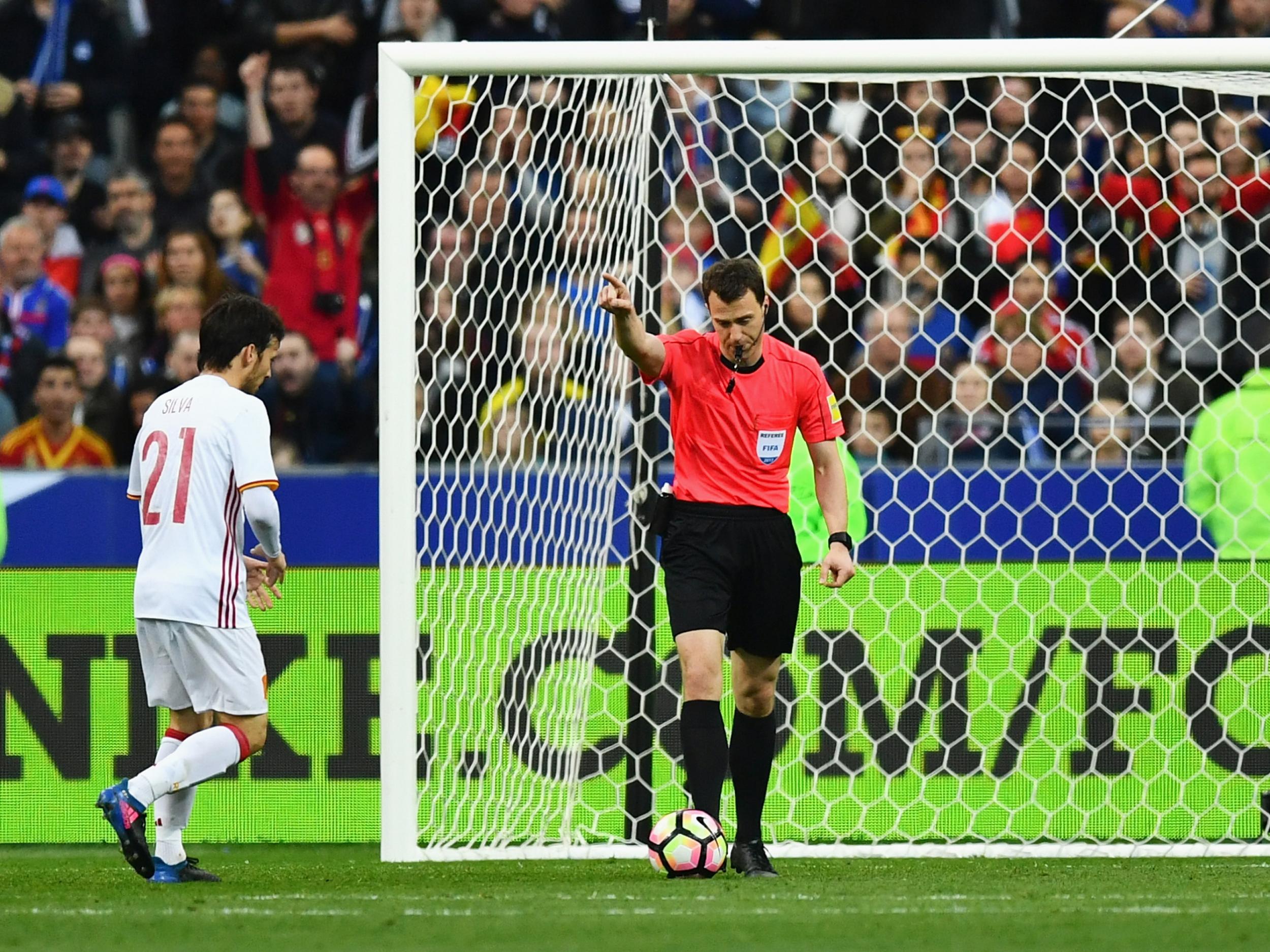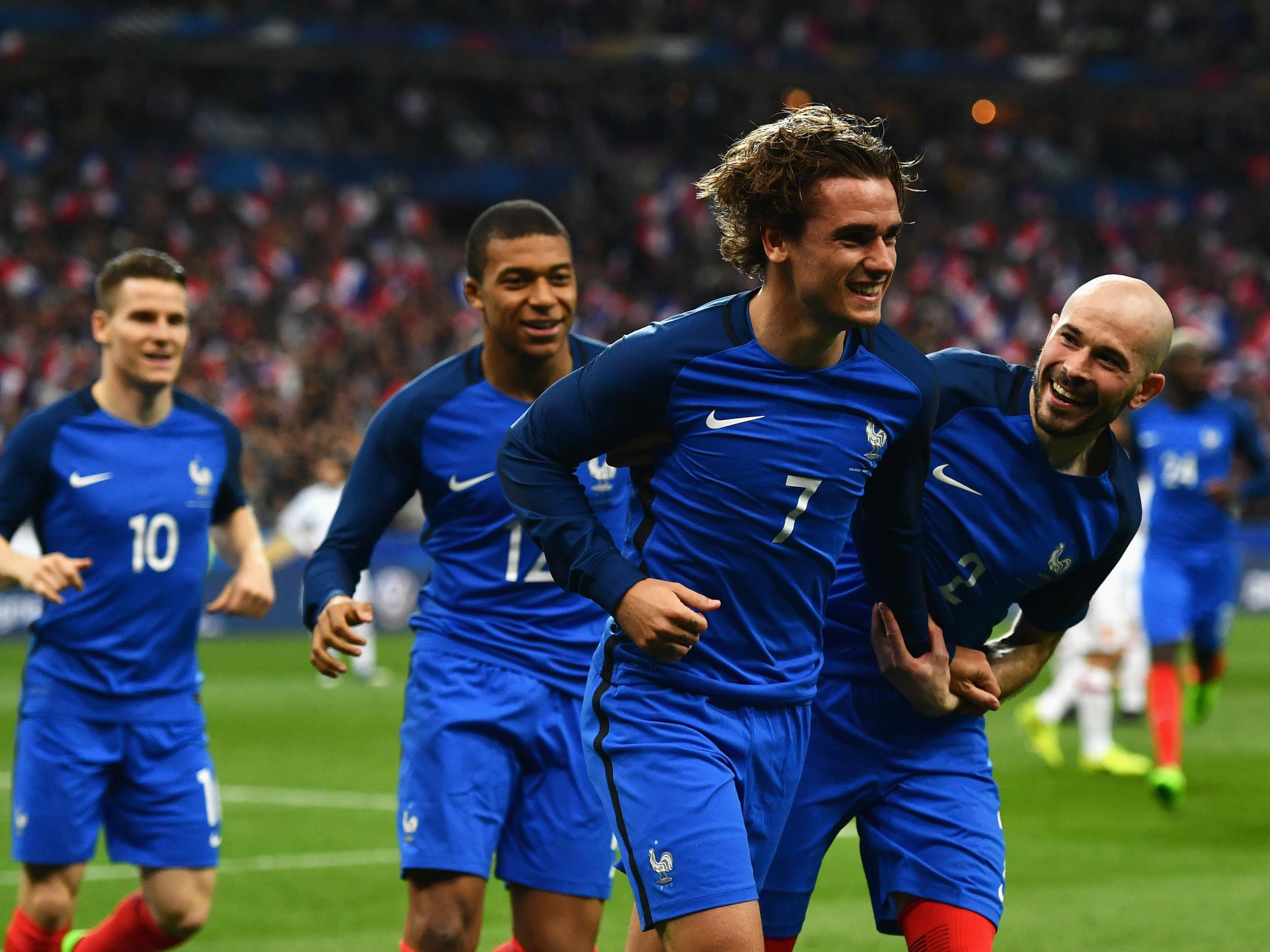The introduction of the Video Assistant Referee allows football to take centre stage again - not decisions
France had two decisions go against them against Spain - but correctly

It said an awful lot about the success of the Video Assistant Referee (VAR) that, well, Didier Deschamps had very little to say.
The new technology tested for France’s 2-0 friendly defeat to Spain had helped official Felix Zwayer rule against the French manager’s side twice - once to chalk off an Antoine Griezmann strike, once to confirm a Gerard Deulofeu goal - and it was impossible to quibble. Deschamps, by contrast, seemed somewhat impressed.
“If it is verified and it is fair, why not,” he said. “It changes football a little. It is against us today, but if we have to go through this, it will be the same for everyone. Afterwards, without it, it would have been different, but it is the evolution of football. That is how it will be.”
That is how it is. Griezmann may have had to be hauled back, but that first use of VAR was a huge step forward for the game - even if some will take that step a little tentatively.
Amid some criticism from pundits like Paul Ince, there did seem a slight sense of a post-game vacuum in the inability to get the managers talking about the decisions, given that there was nothing much to talk about. They were correct, and impressively quick, so on to the actual football.
That is a deeper point here, and another positive. That sense of a vacuum is probably just down to having to adjust, but it would be healthy for the entire game to adjust to a reality where refereeing decisions are not seen as the primary factor in every single result.
There was actually something else said after the game that summed up just how good this can be for football - especially Spanish football. It was when Gerard Pique was asked about the system, and joked that it was because Spain were “wearing white”, in an obvious reference to the perception Real Madrid are favoured by La Liga officials.
The hope is it’s the last time, because it’s also one of the most tiresome aspects of Spanish football. It seems barely a game can go by without refereeing decisions dominating all discussion afterwards, and creating even more sour feelings and bad blood, to the point the referee then also becomes the main focus ahead of the next game. And on it laboriously goes. If this is “discussion down the pub”, it is the worst of it.
VAR can end a lot of that at a stroke, so that people will not be able to talk about the pedantic ins and outs of how a referee came to a particular decision, but are instead left to talk about what we’re all here for: the actual game, and all of its richness. The second use of VAR also summed this up too. If you would rather discuss an offside call, rather than how it was a notional defensive midfielder Sergio Busquets could pull off the double pull-back pass that he did in the move that led to it - and why it is that more defensive midfielders can’t do this - then you’d have to wonder whether the game is really for you.

What’s more, suspicion will be diluted, bad feeling diluted. The authority of the referee will fundamentally strengthened. That is all undisputedly a positive.
The one potential negative fairly raised, however, is whether emotion will be diluted.
Deschamps would have sounded churlish had he himself brought this up, but there might have been some merit in talking about the idea of how Griezmann and the French players and supporters had spent a few seconds celebrating and thinking they had scored… only for it to then be chalked off, bringing a certain flatness.
The problem here is not so much that a goal had been correctly ruled out, since that is a good thing, but what it highlights about the spontaneity of football.
A huge part of football’s thrill is actually that it is so low-scoring, imbuing goals and moments of importance with all the more emotion and drama. If these moments are too willingly and pedantically called back, though, it threatens to remove some of that. The game’s immediacy and visceral nature will be affected, because a degree of emotional hesitation will come in to everything. “Can I celebrate… is that going to be allowed?”

The key, however, is that this is also where VAR was a huge success; where it was actually a double success. There were only two moments from that match called back, both were dealt with in a combined time of under two minutes, and both were absolutely correct.
It’s much better that than a game being decided by an injustice.
It’s also not like football operates without this sense of hesitation already. In the 1998 World Cup, Sol Campbell thought he had scored a momentous golden goal against Argentina… only for it to be hauled back. Then there’s the case of football’s most contentious recent game, one of far more importance than an international friendly, and one that VAR could really have aided: Barcelona’s 6-1 comeback against Paris Saint-Germain.
Even beyond the debate about Luis Suarez’s dives and so much gamesmanship, you had the match’s moment of deliverance, its emotional high point: Sergi Roberto’s winner. That will go down in history as one of the European Cup’s great moments but there, in the middle of the image as the full-back lands on the ground and the ball lands in the net, is Leo Messi looking across to the linesman. There was an element of emotional hesitation there, before the ultimate emotional release.
By properly implementing VAR, meanwhile, football will release itself from so much nonsense; from so many wrong calls; from so many wrong winners; from so many injustices.
It is not perfect, and won’t lead to perfect refereeing given the general flow of the game - but it is right.
Join our commenting forum
Join thought-provoking conversations, follow other Independent readers and see their replies
Comments
Bookmark popover
Removed from bookmarks